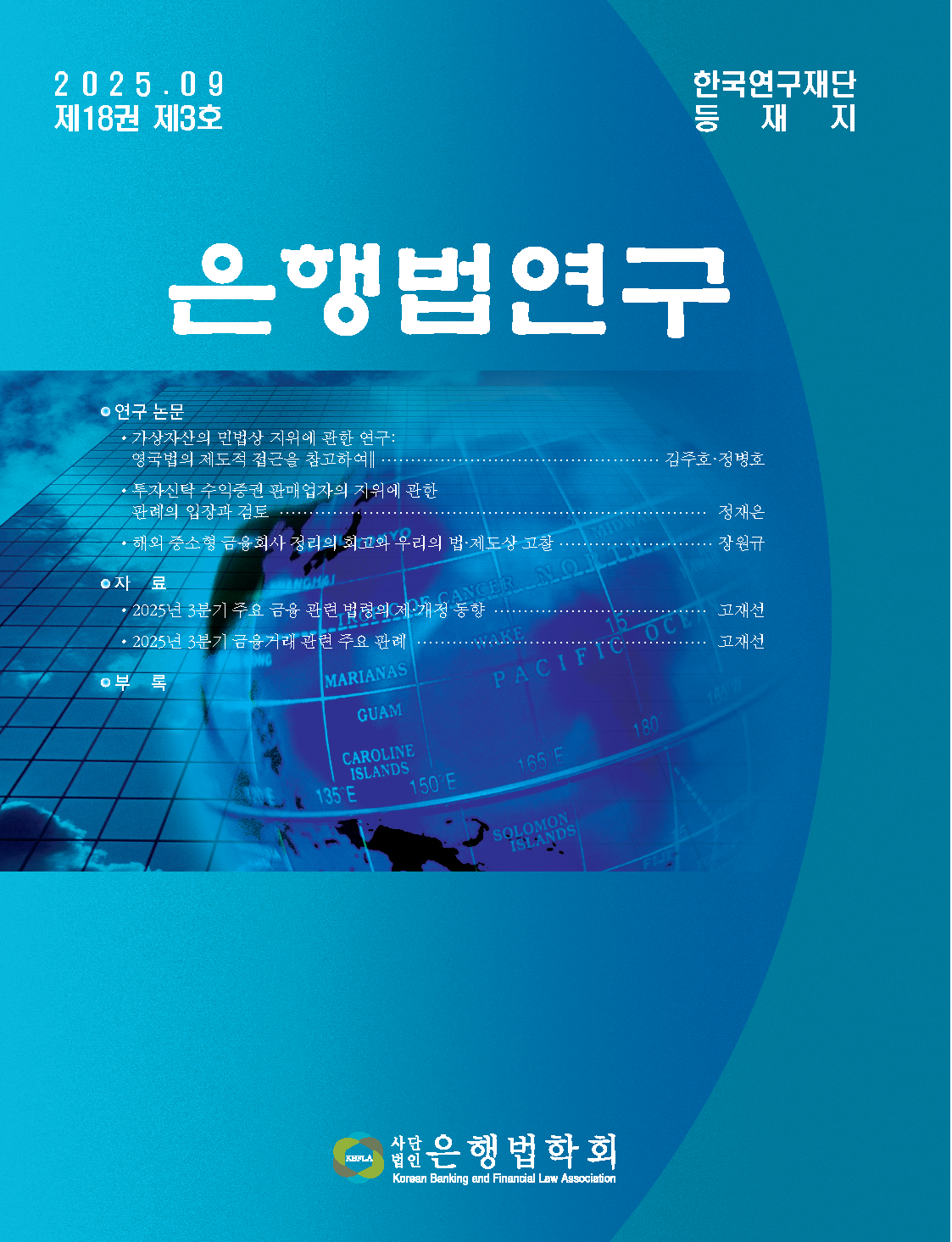학술논문
투자신탁 수익증권 판매업자의 지위에 관한 판례의 입장과 검토
이용수 0
- 영문명
- The Legal Status of Distributors in Investment Trusts: Reassessing Supreme Court Precedents
- 발행기관
- 은행법학회
- 저자명
- 정재은
- 간행물 정보
- 『은행법연구』제18권 제3호, 43~77쪽, 전체 35쪽
- 주제분류
- 법학 > 법학
- 파일형태
- 발행일자
- 2025.09.30
7,000원
구매일시로부터 72시간 이내에 다운로드 가능합니다.
이 학술논문 정보는 (주)교보문고와 각 발행기관 사이에 저작물 이용 계약이 체결된 것으로, 교보문고를 통해 제공되고 있습니다.

국문 초록
이 글은 투자신탁 수익증권 판매업자의 법적 지위에 관한 판례의 입장과 그 타당성을 검토한다. 기존 대법원 판례는 판매업자를 자산운용사의 대리인이 아닌 독립된 당사자로 보고, 투자자와 체결하는 수익증권 매매계약의 상대방으로 인정해 왔다. 과거 투자자에게 수익증권을 판매한 자가 투자신탁 수익증권을 자기계산으로 매매함으로써 판매 및 환매했던 점, 투자신탁이 일종의 유사예금처럼 기능했던 점 및 운용과 판매 분리 전후 투자자의 당사자 인식 등에 주목하면, 그 결론의 논리적·구체적 타당성을 수긍할 수 있다.
그런데 투자신탁 수익증권 판매업자의 법적지위는 판매업자가 집합투자업자 및 투자자와 체결하는 계약 및 거래실무에 따라 달리 판단해야 마땅하고, 그 변화에도 불구하고 한 가지 판례의 결론이 그대로 적용될 수는 없다. 지금은 과거 대법원 판례의 입장이 처음 형성되던 때와 달리, 판매업자가 통상 자기계산 소유의 형식으로 수익증권의 판매와 환매에 개입하지 않는다. 여기에 모집식 판매, 현행 법령상 환매 구조, 판매업자와 투자자간 수익증권저축계약과 집합투자업자와의 위탁판매계약, 기타 거래 실무를 종합하면, 판매업자는 집합투자업자와 투자자 사이의 중개인 또는 대리인으로 판단된다. 투자에 대한 인식과 불완전판매책임에 대한 법리가 성숙함으로써 당사자성 인정이 불가피할 구체적 타당성을 찾기도 어렵다고 생각한다.
이 주제에 관해서는 이미 여러 연구가 있다. 다른 연구에서 다룬 내용은 가능한 인용으로 대체하고, 다음 각 점을 중심으로 서술한다: 첫째, 금융상품 ‘판매’의 사법(私法)적 개념을 밝히고, 여기에 판단대상 법률관계를 구성하는 요소를 투입함으로써 결론을 연역했다. 판단대상 법률관계의 개별적 특징에서 귀납하여 그 법적 성격을 규명하는 접근과 다른 점이다. 둘째, 과거 판례의 입장이 타당할 수 있었던 근거를 되짚어 그 근거가 달라진 지금에는 더 이상 같은 결론이 유효할 수 없다는 공감대를 형성하고자 했다. 무려 사반세기 간의 제도와 시장 변화에도 불구하고 법원의 결론이 유지될 수 있다면, 그것이 도리어 이상한 일이다. 이 글이 그 변화를 마주하고 새로운 결론에 도달하는 데에 기여할 수 있기를 바란다.
영문 초록
This study examines the judicial stance on the legal status of distributors of investment trust beneficiary certificates and evaluates its validity. The history of collective investment in Korea has largely coincided with the history of investment trusts, and in related disputes the distributor and the investor have traditionally been regarded as the key parties. The Supreme Court has consistently recognized distributors not merely as agents of asset management companies, but as independent parties and contractual counterparts of investors in sales agreements.
Such a position may have been reasonable in the past, when management companies or distributors themselves engaged in sales and redemptions on their own account. However, in today’s market—where public offering (subscription-based) sales dominate and redemptions of the past type are prohibited—distributors no longer participate on their own account in either sales or redemption processes, making the traditional view untenable. Applying the conceptual framework of legal structures in financial investment product sales, distributors should instead be understood as intermediaries or agents rather than counterparties to sales. Importantly, the roles of intermediary and agent still perform a critical function in connecting investors to the
capital market, and when combined with investor-protection obligations, impose a high standard of duty of care. Thus, investor protection can be effectively ensured through liability for damages without necessarily granting contractual party status to distributors.
The purpose of this article is to revisit the historical grounds that once justified the judicial position on distributors and to show that those grounds no longer hold today, thereby fostering consensus on the need for change. For this reason, while theoretical debates already discussed extensively in prior literature are only cited briefly, this article instead devotes particular attention to the investment trust system as it existed two decades ago, when the courts first established their stance. By doing so, it aims to clarify both the rationale and the limitations of the traditional approach, thereby laying the groundwork for a revised understanding of the legal status of distributors in investment trusts.
목차
Ⅰ. 논의의 배경과 의의
Ⅱ. 투자신탁 수익증권 판매의 법률관계
Ⅲ. 투자신탁 수익증권 판매업자의 지위
Ⅳ. 판례의 검토
V. 결 론
참고문헌
키워드
해당간행물 수록 논문
참고문헌
교보eBook 첫 방문을 환영 합니다!

신규가입 혜택 지급이 완료 되었습니다.
바로 사용 가능한 교보e캐시 1,000원 (유효기간 7일)
지금 바로 교보eBook의 다양한 콘텐츠를 이용해 보세요!



